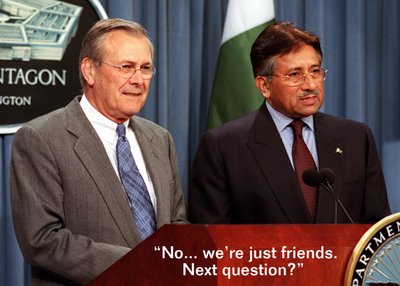Don't mess with Musharraf
updated below
Last week, Pakistan has accused the Bush administration of threatening it with military force if it did not cooperate in the War on Terror immediately following 9/11. In a recently released memoir, Pakistani President Pervez Musharraf stated that Undersecretary of State Richard Armitage declared that Pakistan would be “bombed back to the Stone Age” if he did not . (It should be noted that Armitage denies ever making such a statement, and is chalking it up to a gross mistranslation.)
In a recently released memoir, Pakistani President Pervez Musharraf stated that Undersecretary of State Richard Armitage declared that Pakistan would be “bombed back to the Stone Age” if he did not . (It should be noted that Armitage denies ever making such a statement, and is chalking it up to a gross mistranslation.) Musharraf also declared that that America paid Pakistan millions of dollars in bounties for catching Al Qaida fighters in the past five years. While this is not necessarily criminal, it is an embarrassing exercise for the world’s City on a Hill to participate in.
These are bold allegations coming from a man I consider the most important man in the world. Why do I consider Musharraf so damn significant? It’s not that his country is the most powerful in the world (I actually rank Pakistan #9). But Pakistan is ranked #1 in my book in three noteworthy categories:
1. Pakistan is America’s most powerful partner in the War on Terror. Britain offers the most troops in Iraq and Israel may offer the most moral support, but Pakistan is the one on the front lines catching the actual terrorists in places others can’t.
2. Pakistan is the world’s most powerful entity that can believably be expected to switch sides. Russia may still resent America, China may challenge us in a generation and France may fight us diplomatically, but Pakistan is a country that could realistically become a true enemy along the lines of Iran or North Korea within a very short period of time—if they were motivated to do so.
3. Pakistan is the world’s most powerful country run entirely by one man. He’s a dictator who doesn’t have to answer to a Parliament, a Cabinet or any voters. And when that one man executes policies that benefit us but are opposed by the vast majority of his people, we should be increasingly concerned with his well being. A single well-aimed bullet could turn America’s key ally into America’s greatest foe. (Did I mention he has several attempts on his life each year?)
Needless to say, Musharraf is far too important a global player to piss off at this stage in the game. If the allegations are true, then we should all be concerned with his decision to accuse Bush Administration now. Because allies who break rank with talk sometimes follow that up with action.
UPDATE:
No more than six hours after I declare Pakistani President Musharraf the most significant man in the world, and he ends up being interviewed by the wittiest man in the world.
Catch Musharraf on The Daily Show with Jon Stewart, which originally aired on Tuesday, September 26. (My personal favorite moment: when Stewart asks Musharraf who would win an election in Pakistan between Bush and Bin Laden, and Musharraf responds "they'd both lose miserably."


Yeah, pretty correct analysis. The only thing I find peculiar here is the term "embarassing", coming as it does from a self proclaimed realist.
In time of war, in a most perfect of worlds, you would have allies who stand with you, shoulder to shoulder, because they believe in you and in your cause (of cause one may argue that in a most perfect of worlds there would be no war anyway, but that's besides the point:-)) In the real world, you get the allies you can get or, at times, the one you absolutely must have, by any means necessary. Persuasion, if it works, bribery, if needed, threats if necessary. And nowhere is this more true than in the Middle East and its vicinity. That's not a region where people will support you out of gratitude for what you've done for them in the past. There are only two things tht count. The second is what they expect to get from you in the future. nd the first, an most important, is the damage you can cause them. You can try all the sweet talk in the world, if they believe that Al Quada can hurt them worse than you can, guess which way their loyalties go.
As a little aside, two of the allies in this most noble of wars, aka WWII (yes, again), were Iceland, which provided the key bases for the Battle of the Atlantic, and Iran, which provided an overland supply route for Western goods to reach the Soviet Union. And you may check what means were used to bring them into the the fold.